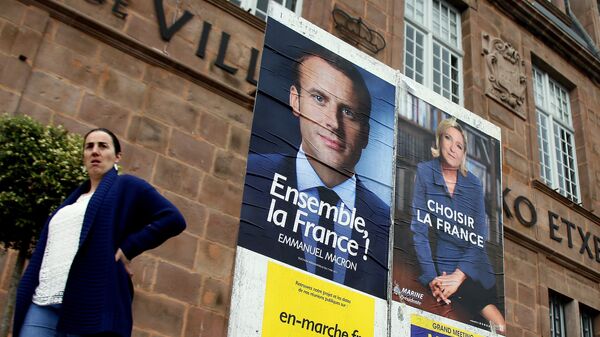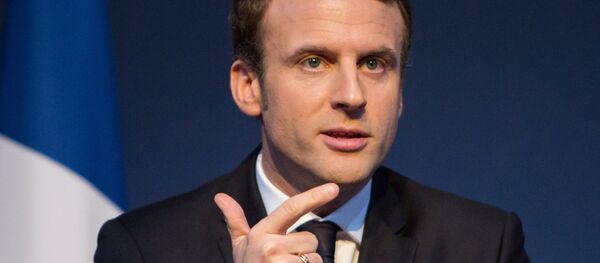Macron won with a slight advantage in the first round, having received 24.01 percent of the votes, while Le Pen got 21.3 percent.
Meanwhile, a poll conducted by Elabe-BFM TV revealed that only 31 percent of French citizens are satisfied with the choice that they will have to make between Le Pen and Macron.
While many French have expressed their dissatisfaction in the social networks, still others have taken to the streets, where the "Neither Macron nor Le Pen" banners were in place during traditional left-wing May Day holiday demonstrations earlier this month.
Arrogant Macron
Notably, the independent presidential celebrated coming in first in the first round of the elections with 24 percent by treating himself to the posh Paris cafe La Rotonde, causing grumbles among social network users.
His new position of presumed unconditional favorite allowed Macron to dictate his terms to the losers, many of whom have no choice but to support him, RIA Novosti's Igor Gorshkov said.
For his part, leader of the hard left radicals Jean-Luc Melenchon reacted angrily to Macron's unwillingness to change his proposals on France's labor reforms, among other things.
"He could make a gesture, he could say: look, I understand you, I’m renouncing my project of reforming the Labor Code so that you can take a step toward me."
Macron responded by saying that he "does not intend to look for the electorate" by sacrificing his plans. Commenting on the results of the election campaign, Melenchon in turn said that his voters were offended by Macron.
The arrogant presidential favorite also used stern language towards his former fellow Socialist Party members, in a move that dismayed the party's First Secretary Jean-Christophe Cambadelis.
"Macron said quite definitely that he does not want the Socialists. He wants neither negotiations nor a coalition with us. His goal is to break our party, and then break the right-wing party of the Republicans," Cambadelis said.
An anti-Le Pen bloc is weakening
Marine Le Pen tried to capitalize on Macron's arrogance back on May 3, when she warned during a pre-election debate that Macron's "true nature", namely, "a banker's coldness" will come to the fore.
When lagging behind, Le Pen desperately tried to attract new voters by saying, in particular, that she intends just to mend, not to abolish the United Europe.
The concessions on the delicate issue related to the EU led to the National Front being supported by new allies.
For example, an agreement with Le Pen was concluded by the leader of right-wing sovereignist party Debout la France, Nicolas Dupont-Aignan, who collected 4.7 percent of the votes in the first round and came in sixth.
Le Pen announced that she was ready to appoint Dupont-Aignan Prime Minister, and also promised that in the event of her victory, the French government would be a coalition.
The day before the runoff vote, one can safely say that nothing like the 2002 protests against a National Front candidate will take place.
"Instead of mobilization, the far-left, the driving force of street politics, spent time arguing whether the vote in the second round makes sense or not," Gorshkov said.
Meanwhile, millions of disappointed French, whose candidate did not make it to the second round, will now have to decide whether they are prepared to cast ballots in the runoff or not.
"Strangely enough, this sort of spontaneous protest of random voters may give a ray of hope to the nationalists," Gorshkov said.
"It is estimated that if the runoff vote is attended by 90 percent of those who will back Le Pen and only 65 percent of Macron supporters, the National Front will celebrate the victory," he concluded.





